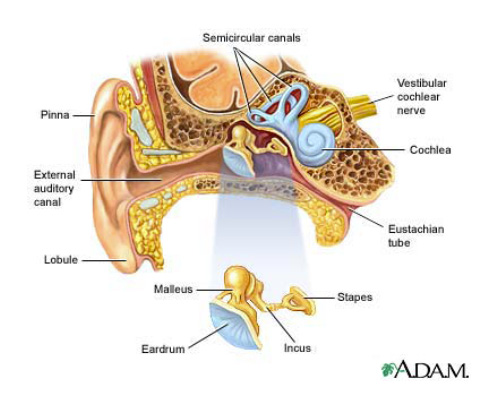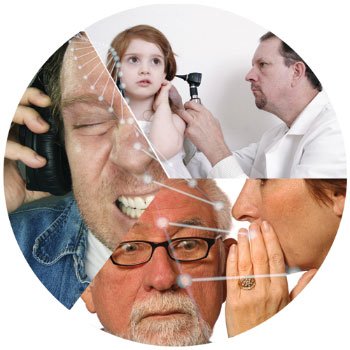Hearing Loss
How We Hear
A better understanding of hearing loss begins by understanding how we hear.

Outer Ear — Sound waves are collected by the outer ear and channeled along the ear canal to the eardrum.
Middle Ear — The middle ear is an air-filled chamber connected to the nasal and throat passages by the eustachian tube, the purpose of which is to equalize the air pressure on both sides of the eardrum. The eustachian tube is usually closed but is opened naturally when you swallow or yawn. When sound waves reach the eardrum, the impact creates vibrations which are transferred through a series of three tiny bones. These bones mechanically connect the eardrum to the oval window of the inner ear. The movement of this oval window transmits the pressure waves of sound into the inner ear.
Inner Ear — The cochlea is filled with fluid and lined with thousands of microscopic hairs. The vibrations are transmitted to the fluid in the cochlea, where the hair cells are bent by the wave-like action of fluid inside the cochlea. The bending of these hairs sets off nerve impulses that are then passed through the auditory nerve.
Auditory Nerve — The auditory nerve carries the signal to the hearing centre of the brain, which translates the impulses into what we perceive as “sounds”.
Symptoms of Hearing Loss
A better understanding of hearing loss begins by understanding how we hearApproximately one in five people between the ages of 40 and up suffer from some degree of hearing loss. Because hearing loss can develop over several years, most people are not aware of the extent of their loss until family or friends bring it to their attention. Even then they might deny that they have difficulty hearing.
Back To Top ⇪Signs of Hearing Loss
- Do you constantly ask for words to be repeated?
- Does it seem that most people are mumbling?
- Do you turn the TV up so loud that others complain?
- Do you have difficulty hearing on the telephone?
- Do you have difficulty hearing in background noise?
- Do you find yourself withdrawing from social gatherings because you cannot follow conversation?
- Do you have ringing in your ears?
- Have you been exposed to significant noise in the workplace?

Causes of Hearing Impairment
Most often a hearing loss develops gradually and painlessly. Hearing can be damaged by:
- Exposure to loud or constant noise
- Inherited medical condition
- Illness
- Natural aging process
- Traumatic injury
- Ototoxic medications
Types of Hearing Loss
Conductive Hearing Loss occurs when the eardrum, bones and membranes don’t properly transmit vibrations to the cochlea. There is an obstruction to sound waves from reaching the inner ear. Accumulation of earwax, perforation of the eardrum, accumulation of fluid in the middle ear, or abnormal bone growth in the middle ear are some causes of conductive loss, which can often be corrected medically.
Sensorineural Hearing Loss is characterized by deterioration of the hair cells that line the inner ear. Causes include the aging process and excessive exposure to loud noise. Ninety percent of hearing loss is sensorineural. If you have a sensorineural hearing loss, you can still hear, but you are unable to hear the full range of sound, both in terms of pitch and loudness.
Mixed hearing loss involves a combination of both conductive and sensorineural hearing loss.
Approximately 10% of all hearing losses may be helped medically. Thanks to today’s technological advances, it is likely that the remaining 90% may be helped with hearing aids.
Back To Top ⇪Testing for Hearing Loss
If you suspect a hearing loss, the first step is to make an appointment with an audiologist.
Testing is painless, comfortable and safe. It includes checking your ability to recognize everyday words at different volume levels, and to hear different tones. The data from this test will be used to determine the type and severity of your hearing loss, and whether you might benefit from hearing aids.
Back To Top ⇪ Follow Us on Facebook.
Follow Us on Facebook.